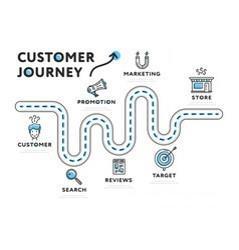
4 minute read
How to Create a CRM Strategy in 10 Steps

1.Set business goals you want to achieve
Advertisement
2.Create personas for customers
3.Be aware of your competitors
4.Identify customer journey
5 .Develop sales process and channels
6.Assign team to handle CRM software
7.Define CRM categories
8.Understand which key performance indicators to track
9.Set up CRM software correctly
10.Measure results and enhance processes
1. Set business goals you want to achieve

The first thing you need to do as part of the CRM strategy is to be aware of what you want your business to achieve. Known as goals, they will give you a better idea on how to implement CRM software and use its features to your advantage.
2. Create personas for customers

You must understand your customers so that you are aware of their requirements. The best way to do so, is to create a persona, which includes all information about ideal consumers for your business. It contains details such as income, education, gender, location, and interests. With this information, you are in a better position to market and sell to your target audience.
3. Be aware of your competitors

As a business, you should be aware of what your competitors are doing at the moment. The reason is that you can identify industry trends and learn how to improve the effectiveness of your marketing efforts. On top of that, you will understand if your unique selling proposition is good enough to differentiate your business from your competitors.
4. Identify customer journey

You should be aware of the process the consumers have to go through to convert them into customers. It encompasses how people get to know about your business all the way to addressing their needs with your products and services. As this is one of the best CRM strategies, you should implement it immediately.
5. Develop sales process and channels

As part of the CRM process, you need to understand how you are going to sell to your customers. Are you planning on approaching them directly or will you use a reseller or distributor? Another crucial part of CRM strategy is how you define your sales process.
6. Assign team to handle CRM software

The next step for CRM management is to identify which employees will be using this tool. If they don’t have any experience using this software, part of the CRM strategy is to train them. On top of that, you have to find out which employees will benefit the most from this CRM process.
7. Define CRM categories

Every CRM software in the market has a different definition for terminologies such as lead, prospects, opportunities, and contacts. Knowing the difference will help you customize the CRM strategy, to meet the needs of your business.
8. Understand which key performance indicators to track

Part of the best CRM strategies is to know which metrics are crucial to your business. Known as key performance indicators (KPIs), you should select those which align with your company’s goals.

Once you have all these CRM strategy steps in place, the next move is to set up the tool properly. It depends on which CRM software you use, as they have different processes.
10. Measure results and enhance processes
Once you get the CRM software up and running, you should start to keep track of the KPIs. The data you collect should give you a picture on which areas of operation are in need of improvement. With these types of CRM strategies in place, your business will benefit from the advantages these tools offer.

Make sure you follow the steps highlighted above to create the best CRM strategy for your business! Resource Link:- How to Create a CRM Strategy in 10 Steps

